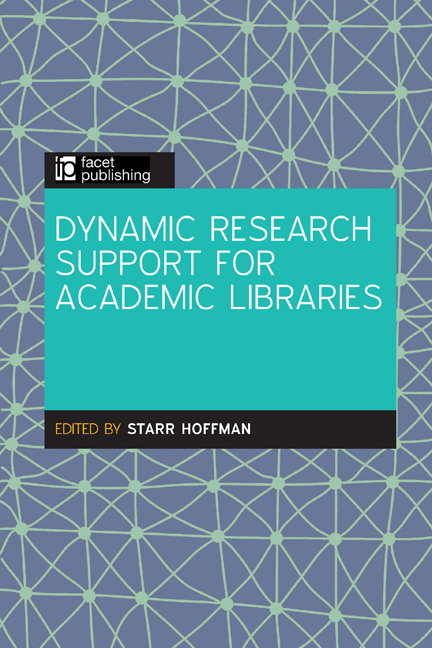Book contents
- Frontmatter
- Contents
- Editor and contributors
- Preface
- Introduction: a vision for supporting research
- PART 1 TRAINING AND INFRASTRUCTURE
- Introduction to Part 1
- 1 Constructing a model for Mexican libraries in the 21st century
- 2 Researching illustrated books in art history: a brief history of the Biblioteca Digital Ovidiana project
- 3 The ‘Developing Librarian’ digital scholarship pilot training project
- PART 2 DATA SERVICES AND DATA LITERACY
- PART 3 RESEARCH AS A CONVERSATION
- Index
3 - The ‘Developing Librarian’ digital scholarship pilot training project
from PART 1 - TRAINING AND INFRASTRUCTURE
Published online by Cambridge University Press: 08 June 2018
- Frontmatter
- Contents
- Editor and contributors
- Preface
- Introduction: a vision for supporting research
- PART 1 TRAINING AND INFRASTRUCTURE
- Introduction to Part 1
- 1 Constructing a model for Mexican libraries in the 21st century
- 2 Researching illustrated books in art history: a brief history of the Biblioteca Digital Ovidiana project
- 3 The ‘Developing Librarian’ digital scholarship pilot training project
- PART 2 DATA SERVICES AND DATA LITERACY
- PART 3 RESEARCH AS A CONVERSATION
- Index
Summary
In February 2014 a group of library faculty, curators, and staff at the University of Florida (UF) Smathers Libraries formed the Digital Humanities Library Group (DHLG). The group was to be a reading group to discuss issues on digital scholarship (DS), including the state of DS in the UF libraries. Members also had the intention to put the theory into practice. The group began with an invitation to librarians and staff. Twenty-six responded, the majority of whom were library faculty. The first few meetings were well attended, with over a dozen attendees. Within six months, a training project intended to give us new DS skills was created, a mini-grant was procured and the ‘Developing Librarian’ digital scholarship pilot training project began. This paper will use ethnographic methods – participant observation, surveys and interviews with individual participants – to tell the narrative of this project: how and why it started, what goals and aspirations the participants have, and how they evaluated it. As I write this, we are in the 11th month of the 12-month grant. Most participants agree that the project will continue after the grant officially ends. While a definitive assessment cannot yet be made, every group has nearly completed their respective projects and everyone agrees that we have learned a great deal.
In the beginning
The DHLG Developing Librarian Project benefits us all by bringing us together as a community of practice, having us all learn together and learn to work together, and having us be seen as equals and collaborators with our teaching faculty.
Respondent to survey question on how the project benefits the libraries
In the beginning there was the University's ‘Data Management and Curation Task Force,’ co-chaired by Laurie Taylor, the library's Digital Scholarship Librarian. Blake Landor, our Classics, Philosophy and Religion librarian, was asked to serve on it, and he agreed, ‘without really knowing what I was getting myself into’ (Landor, 2015a). Landor soon questioned his own place in this group: ‘I felt a little out of place on that committee, it was dominated by people in sciences, understandably … not much of the discussion dealt with things that I was directly involved in’ (Landor, 2015b).
- Type
- Chapter
- Information
- Dynamic Research Support for Academic Libraries , pp. 33 - 44Publisher: FacetPrint publication year: 2016



